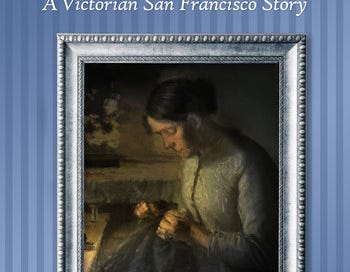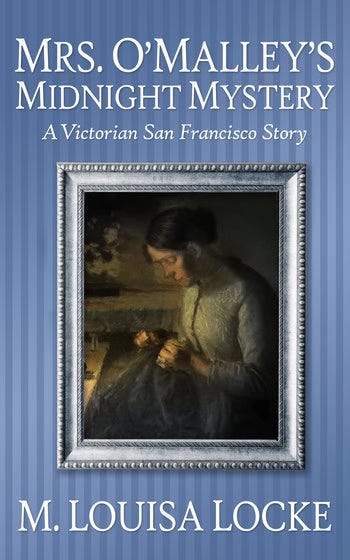Welcome, I’m Mary Louisa Locke, the author of the USA Today best-selling Victorian San Francisco Mystery series and the Caelestis Science Fiction series. In this daily newsletter, I reflect on my life as an indie author trying to age gracefully. Occasionally, I will also publish some of my shorter fiction in this newsletter to read for free.
Daily Diary, Day 1672:
Brief check-in: Yesterday, there was a sort of misty drizzle (mizzle?) all day, so never a good time to walk. Today, no promised rain, but still some very threatening clouds.
Throughout the month of April, I will be offering, for free, the seventh short story in my Victorian San Francisco mystery series, Mrs. O’Malley’s Midnight Mystery. These posts will come out every Tuesday and Thursday. This story, right on the border between being a short story and a novella, actually has chapters, so below is the first scene in the first chapter. (And if you are impatient, you can just go and buy either the ebook or audiobook for only $1.99)
Mrs. O’Malley’s Midnight Mystery
by M. Louisa Locke
Copyright, 2020
Chapter One: Scene 1
Sunday evening, October 2, 1881
Beale Street, San Francisco
Mrs. O’Malley put down her sewing as she heard a key in the door to the tiny two-room flat, smiling as her oldest daughter, Bridget, who everyone called Biddy, swept in.
“Oh, Ma, you made my favorite, molasses cookies,” Biddy said as she hung her hat and cloak on the peg by the door and made a beeline for the plate of cookies cooling on the old wooden kitchen table.
“Did you have a good time with Mr. O’Doyle?” Mrs. O’Malley asked quietly, not wanting to wake her four boys, who were asleep behind the curtain that turned a corner of the kitchen into a bedroom each night.
Mrs. O’Malley had known and always liked Frank O’Doyle, ever since the young man and Biddy were young scamps tearing around the neighborhood together. She had heard he now had a good job clerking in his uncle’s grocery store north of Market. Her daughter hadn’t mentioned him for some time. As a result, Mrs. O’Malley was pleased when Biddy told her of her plans to spend the evening with him this Sunday.
Recently, her daughter had started going out on weekends with two of the young women she clerked with at the Silver Strike Bazaar. As far as Mrs. O’Malley could determine, this meant Biddy walked around Woodward’s Gardens with her friends until some young men struck up a conversation with them and offered to treat them to dinner. Young men whose names and jobs remained a mystery. Biddy assured her this was a perfectly harmless way of spending an evening out, but Mrs. O’Malley worried.
Biddy finished the cookie in two bites, then she said, “We went to the chop house on Folsom and Ninth. Not much else is open on Sundays. Frankie sprang for a full dinner with all the trimmings. Good thing it wasn’t raining so we could walk back here instead of taking the omnibus. Otherwise, I might be still so stuffed I wouldn’t be able to eat one of these cookies you made special for me. Oh, Ma, look what Frankie brought us.”
Her daughter pulled a string bag out of her purse and showed her three large, slightly bruised onions, an oddly shaped turnip, and two small tins of sardines, saying, “The tins got a little banged up––look, they came all the way from France! He says as long as the cans aren’t punctured they’re still good, but his uncle doesn’t like to sell them that way.”
“That was kind of him.” Mrs. O’Malley picked up the strip of dark pansy-colored satin she had been working on and began to sew the small neat stitches that created a ruffle for the bottom of a wealthy woman’s fancy dress.
Biddy added, “I told him I wished he was still working as a butcher’s boy. A couple of pork chops would have been a treat. But then, every stray dog in town would have followed me home.”
“Why don’t you put the sardines up on that top shelf? Your sister Alice has been going on about wanting something she calls high tea for her birthday treat––read about it in one of her books. I believe if I make scones with clotted cream and mash up those sardines and put ‘em on those little crackers you bring home from the Silver Strike, that might just do.”
“That’s a smart idea, Ma. All four of the boys will turn up their noses at it, but it will make her feel special.” Biddy put the food away and then sat down on one of the benches around the kitchen table and reached out for a second cookie.
“That’s the last one, Biddy. There’s just enough for everybody to have two for their school lunches tomorrow. That plus hard-boiled eggs and the last of the apples are going to have to do them. Always a bother when I get paid on Saturday night––with the groceries closed on Sundays. I’ll do the shopping tomorrow morning, if you can drop off the washing on your way to work.”
Mrs. O’Malley worked nights, cleaning, for the Sisters of Mercy at St. Mary’s Hospital, a couple of blocks up on Rincon Hill. It was hard work that didn’t pay all that well, but it was a welcome blessing for a widow with seven children to feed. When her husband died four years ago, she had needed to be able to stay home during the day with the three youngest––Alice who was only four then, and the youngest of her two sets of twin boys, Callum and Connor, had just turned one. This was one of the only jobs that gave her that choice. She continued to do piece work as well to help pay the rent.
Biddy nodded and then yawned. “Make sure I’m up by five-thirty, then. Gives me time to bathe and press my blue dress before I leave. Need me to work on the second ruffle for awhile before I go to bed?”
Biddy had worked in the dressmaking department of the Silver Strike before getting her clerking job there last winter. She had asked Miss Minnie and Miss Millie Moffet, the two elderly dressmakers who now ran the department, if she could bring some finishing work home with her for her mother. After seeing a sample of Mrs. O’Malley’s work they had readily agreed. Biddy had been helping her out with piece work off and on since she was eight, but tonight was supposed to be her daughter’s one evening to just enjoy herself, so it was good of her to offer to help. That was Biddy, always willing to lend a hand.
She said, “Thanks, dear. But I shouldn’t have any trouble finishing both ruffles before morning, so you can take them back and pick up some more. You know, if I don’t have something to keep me busy, the night just drags.”
“If you’re sure. Then I guess I will turn in.” Biddy got up and stretched. She said, “Shall I get Callum and Connor up before I go, and is the kitten in with them?”
“The kitten’s in the next room. Don’t let him out when you go to bed. I can’t have him snagging this material with his sharp little claws. I’ll be glad when he gets bigger and starts earning his keep. As for the boys, no need to get them up. They were both good about going to the privy before they went to bed, and I think they’ve finally figured out how to wake up enough to use the chamber pot.”
“I hope so! I don’t remember the older twins, or either of my sisters, still wetting the bed at five.”
“Poor things. You gave all the older ones such a hard time, they didn’t dare.”
Biddy grinned and said, “I suppose the fact that I was the one who was going to have to put the sheets to soak may have had something to do with it.”
Mrs. O’Malley looked at her daughter with affection. Only the Blessed Mother knew how the family would have survived without Biddy’s help, especially after her husband, Brian, died in seventy-seven. Even when he was still alive, making decent wages as a bricklayer, Mrs. O’Malley had needed to do piece work to help feed their growing brood.
When the depression hit in the city in the mid-seventies, work for Brian became scarce. That’s when Biddy left school to take over minding her brothers and sisters and help Mrs. O’Malley sew in order to keep food on the table and a roof over their heads. Brian hated that both his wife and oldest daughter had to work, but it couldn’t be helped. Unlike some men, who just blamed everyone else and drank away their troubles, her husband had gone out, day after day, looking for any sort of work. When he did get a job, it was back-breaking and paid little more than pennies a day.
Yet he would come home each night and pretend all was right with the world so that his family wouldn’t worry. Until the night, in the middle of making her laugh with some outlandish joke, he’d keeled over, dead. The doctor said it was apoplexy. Mrs. O’Malley knew he’d worked himself to death.
She worried that Biddy was going to burn herself out the same way. She was so like her father, from her dark-red hair and merry blue eyes to her open face, broad smile, and generous heart. Maybe too generous.
Mrs. O’Malley smiled at her daughter and said, “Off to bed with you. You have a long day tomorrow and no need for you to start off with too little sleep.”
To be continued…
Everything I publish in this newsletter is available to anyone who subscribes, but I am always pleased when someone shows their appreciation for what I am writing by clicking the button below to upgrade to paid, thereby providing me more resources so I can spend more time writing my fiction and less time marketing. In addition, please do click on the heart so I know you’ve been to visit and/or share with your friends, and I always welcome comments! Thanks!






Love these short stories. Have all of them on my kindle
It seems to me, since you have gotten your new bed, you have been doing much better heathwise.